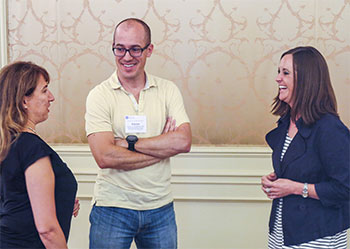Becoming an ophthalmologist takes years of education to learn the intricate details of the eye. It also takes innumerable nights on call, treating open globes and other vision-threatening conditions. Our common goal is to ensure that our patients attain the best visual outcomes in the safest way possible.
However, the battle over optometric scope of practice threatens this pursuit and the very safety of our patients. Determined on a state-by-state basis by elected representatives, scope-of-practice legislation defines what constitutes surgery and determines exactly who may perform surgical procedures.
What you can do as a young ophthalmologist is familiarize yourself with this issue and become an advocate for your patients and your profession. Here is how:

Courtney Bovee, MD (right), talks to fellow ophthalmologists and advocacy leaders Chris Albanis, MD, and Aaron Holtebeck, MD, during a recent secretariat for state affairs meeting.
1. Join Your State Ophthalmology Society
One function of your state ophthalmological society is to ensure legislative safeguards are implemented and maintained to prevent under-trained practitioners from performing procedures that jeopardize patient safety. Many of these societies have a “Day on the Hill” at their respective state capitals to educate legislators about these issues.
2. Attend Congressional Advocacy Day
Every April, the Academy holds the Mid-Year Forum in Washington, D.C. A component of that meeting, Congressional Advocacy Day, provides the opportunity to talk with Congress members about how to protect our patients’ vision. Through the Advocacy Ambassador Program, you can get sponsored to attend and learn how to engage first-hand as a leader.
3. Reach Out to Your Legislator
Be sure to contact your state legislator by phone, email or letter. States such as Kentucky and Oklahoma have already enacted legislation allowing optometrists to expand their scope and include broad laser and non-laser surgical authority. Those states’ laws are further proof that ignoring these issues will not simply make them go away.
4. Learn About the Importance of the Surgical Scope Fund and OPHTHPAC
The Surgical Scope Fund helps state ophthalmology and medical societies ensure patient safety and surgical standards. OPHTHPAC supports federal political candidates on both sides of the aisle who have been identified as friends to medicine, ophthalmology and our patients.
* * *
 About the author: Courtney Bovee, MD, recently finished her glaucoma fellowship at the Massachusetts Eye and Ear Infirmary and serves on the Academy’s YO Advocacy Subcommittee.
About the author: Courtney Bovee, MD, recently finished her glaucoma fellowship at the Massachusetts Eye and Ear Infirmary and serves on the Academy’s YO Advocacy Subcommittee.